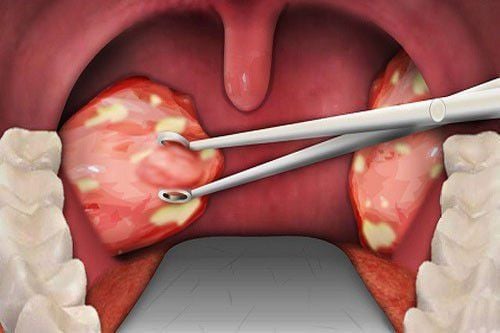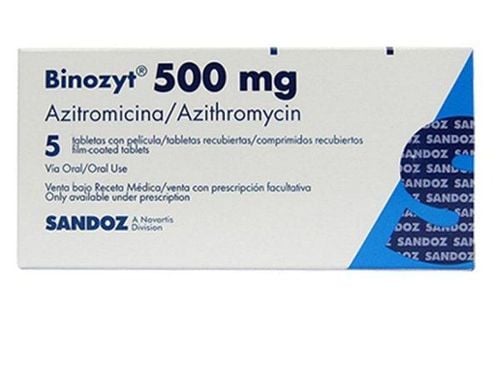Klacid 500mg is commonly used to treat certain bacterial infections such as sore throat, sinusitis, bronchitis, pneumonia, folliculitis, etc. So, what are the specific uses of Klacid 500mg and how should it be used?
1. Uses of Klacid 500mg
Klacid MR 500mg is formulated as tablets, with the main ingredient being Clarithromycin 500mg, belonging to the Macrolide antibiotic group. Klacid 500mg has a broad spectrum of activity against both aerobic and anaerobic bacteria, spirochetes, especially intracellular bacteria.
The active ingredient Clarithromycin has antibacterial activity by combining with the 50S ribosome subunit of susceptible bacteria and inhibiting their protein synthesis. Klacid 500mg is highly effective against many Gram-positive and Gram-negative aerobic and anaerobic bacteria.
The minimum inhibitory concentration of Clarithromycin is two times lower than Erythromycin. Accordingly, Klacid 500mg is indicated in the following cases:
- Lower respiratory tract infections such as acute and chronic bronchitis, and pneumonia.
- Upper respiratory tract infections such as sinusitis and pharyngitis
- Skin and soft tissue infections such as folliculitis, and cellulitis.
- Dental infections.
Klacid 500mg is contraindicated in the following cases:
- People with hypersensitivity to any component of the drug.
- People with a history of congenital or acquired QT prolongation, and ventricular arrhythmias, including torsades de pointes.
- Hypokalemia (risk of QT prolongation).
- Patients with severe hepatic failure accompanied by renal impairment.
- People with renal impairment with creatinine clearance less than 30 ml/min.
Cautions when using Klacid 500mg in the following cases:
- Klacid 500mg should not be used in pregnant women before carefully considering the benefits and risks, especially in the first trimester of pregnancy
- Like other antibiotics, long-term use of Klacid 500mg can increase the proliferation of fungi and bacteria that are not susceptible to the drug. If superinfection occurs, appropriate treatment should be applied.
- Caution when using Klacid 500mg in patients with severe renal impairment.
- Discontinue Klacid 500mg if signs and symptoms of hepatitis appear, such as anorexia, jaundice, dark urine, itching, or abdominal pain. Clarithromycin in Klacid 500mg is mainly excreted by the liver, so be cautious when using this drug in patients with impaired liver function.
2. Dosage and Administration of Klacid 500mg
How to use Klacid 500mg:
- The drug is used orally.
- Do not crush or chew the tablets.
- Take the medicine with meals.
The dosage of Klacid 500mg for adults and children over 12 years old is as follows:
- The usual dose is 1 tablet/day.
- In case of more severe infections, the dose of Klacid 500mg can be increased to 2 tablets/day.
- The duration of treatment with Klacid 500mg is usually 5-14 days, except for community-acquired pneumonia and sinusitis, which require 6-14 days of treatment.
- Dental infections: Use a dose of 1 tablet/day for 5 days.
If you miss a dose of Klacid 500mg, take it as soon as you remember. If it is almost time for the next dose, skip the missed dose and take the next dose as usual.
Overdose of Klacid 500mg can cause gastrointestinal symptoms. Patients should treat accompanying allergic reactions when using an overdose of Klacid 500mg by gastric lavage and supportive care.
3. Side Effects of Klacid 500mg
When using Klacid 500mg, you may experience common side effects such as abdominal pain, diarrhea, nausea, vomiting, and taste disorders.
Common side effects of Klacid 500mg include:
- Digestive system: Taste disorders, diarrhea, nausea, vomiting, stomach pain, indigestion. You may also experience mild to life-threatening pseudomembranous colitis.
- Systemic: Hypersensitivity reactions such as itching, irritation, urticaria, and skin rash.
- Nervous system: Headache.
- Skin: Rash.
Less common side effects of Klacid 500mg include:
- Digestive system: symptoms of cholestasis such as upper abdominal pain, sometimes severe pain.
- Liver: Liver dysfunction, high serum bilirubin level, often accompanied by jaundice, rash, and increased eosinophils (a type of white blood cell).
- Auditory: If used in high doses, deafness can occur, which may be reversible.
Other side effects of Klacid 500mg include:
- Clostridium difficile-induced colitis.
- Increased alkaline phosphatase.
- Anaphylaxis.
- Loss of appetite.
- Anxiety, confusion, disorientation, hallucinations, seizures.
- Increased GGT (gamma-glutamyl transferase, a liver enzyme).
- Glossitis (inflammation of the tongue).
- Decreased hearing.
- Liver failure, hepatitis, hypoglycemia, elevated liver enzymes.
- Insomnia.
- QT prolongation
- high creatinine levels
- Stevens-Johnson syndrome
- Gastritis
- Thrombocytopenia Tongue discoloration, tooth discoloration, tremors.
- Ventricular arrhythmias, dizziness.
If you experience any side effects while using Klacid 500mg, tell your doctor immediately for appropriate management.
4. Interactions of Klacid 500mg with Other Drugs
Do not use Klacid 500mg with the following drugs due to the possibility of serious drug interactions: Cisapride, Ritonavir, Pimozide, Ergot alkaloids, oral Midazolam, Astemizole, Fluconazole, Colchicine, Digoxin, etc.
Klacid 500mg affects the metabolism and effects of some other drugs: Antiarrhythmics, Insulin, Omeprazole, Tadalafil, Sildenafil, Theophylline, Tolterodine, Triazolo Benzodiazepines, Itraconazole, Saquinavir, Carbamazepine, etc.
Klacid 500mg is commonly used to treat some bacterial infections such as sore throat, sinusitis, bronchitis, pneumonia, folliculitis, etc. To ensure treatment effectiveness and avoid side effects, patients should use the drug as prescribed or consult a doctor or pharmacist.
To arrange an appointment, please call HOTLINE or make your reservation directly HERE. You may also download the MyVinmec app to schedule appointments faster and manage your reservations more conveniently.













